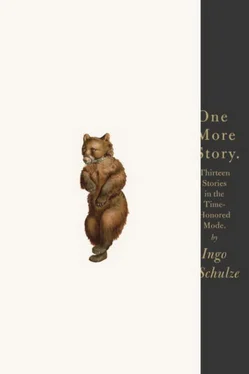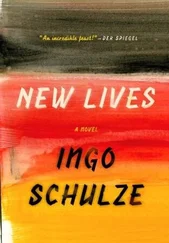Katja asks me if I can’t stay a little longer, we could go for a walk.
“I’ve got a date this evening,” I say. I smile, despite myself.
“Ah,” Katja exclaims. “I can guess.”
“Yes,” I say, “I ran into Katalin again.”
“I would like to have met her,” Katja says.
She accompanies me to the subway entrance. I push her bike. As we stand there at the top of the stairs, I ask when the happy day is.
In August, Katja says, a boy. Leaning forward, we hug, but our tummies touch anyway.
I forget to validate my metro ticket. At the West Station I try to give it to the fellow selling the homeless people’s newspaper, but he declines.
I buy some Leberkäse, oven-baked, 1.60 euros per hundred grams. It weighs a little more, so with bun and mustard, it comes to 2.90 euros.
Across from me at the entrance to the betting office, are two televisions — Michael Schumacher has just won his fourth Grand Prix in a row, exactly ten years after Senna’s death. I buy another half-liter bottle of water. My shoulder bag now weighs exactly what it did when I left Budapest.
I’m on my way back to Budapest. I’m on my way to Budapest. Isn’t that an act of independence and freedom — not leaving home, not returning home, but simply being under way?
I’m sitting on the right, facing the front of the train. I’m relieved and I’m discouraged. The Örkény is lying on my lap. I pull the little ribbon out, the book opens to page 18. I begin to read the one-minute story titled “The Bow.” I’m tired. The Hungarian border guard comes through the train. They do their job quickly. Because the seats block my view of the passports of the travelers ahead of me, I have the impression the border guards are shaking hands with the passengers.
“Must go back Austria,” says a border guard — beard and pointy nose — to a mop of gray hair one row ahead. “Go back!”
The mop of gray hair speaks softly, the border guard loudly. “Buy visa! No multi, Hungary fly, Budapest, go by train out, finish! Must go back. Really go back. Next train go back Austria.”
The border guard — beard and pointy nose — makes sweeping gestures with his arms, his hand is the airplane on which the mop of gray hair flew to Budapest several days before. The mop of gray hair intends, as I understand it, to fly home tomorrow too. He took a little side trip to Vienna, and now they won’t let him back in. “No multi visa. Must go back!”
The mop of gray hair stands up. A trim older gentleman in a pastel pink shirt. He is told to follow the border guard. He’s ready to follow him, but the border guard plucks at the man’s sleeve and mimics pulling on a coat. The mop of gray hair needs to take his baggage and jacket along. But he doesn’t have any baggage or a jacket, just the Vienna guidebook in his hand. Moving toward the front of the train, the border guard and the mop of gray hair vanish from the car.
A hush falls over the car, the train pulls out, the train stops, the train starts picking up speed, we’re departing on time, Hegyeshalom, 4:45 p.m. On the other track a milk train, its cars are red and white, with windows you can still pull down — the merry mood of the children, mothers, grandfathers makes it look as if the train has stopped for a picnic.
We’re moving past the long platform, and then, for a brief moment, I spot two border guards and right afterward, there where the platform makes a dip so you can cross the tracks, stands the mop of gray hair, with his pink shirt and a Vienna travel guide in his hand, and right behind him at an angle, but in fact shoulder to shoulder, a border guard. The mop of gray hair stares at the train where he was sitting just now, as if trying to see what awaits him on the other side. You can’t tell whether the border guard is holding him by his upper arm or not.
In Györ, with its modest but heavily rusted station sign, the border guard — the beard and pointy nose who tracked down the mop of gray hair — gets off and walks down the platform. He’s dragging a bright shiny blue suitcase behind him. He waves to someone, he shouts, he laughs.
Our traveler — he’s past being assigned a name now — presses his head to the window, but all he can see is the border guard disappearing from view. He asks himself why he even wants to see the person the border guard is hailing. He has no real interest in the border guard, any more than he has an interest in the man in the pink shirt. The man in the pink shirt will have some difficulties to deal with, maybe he’ll have to postpone his flight. Then again, maybe the border guards in Hegyeshalom will help him.
Because their job isn’t really travelers with Vienna guide books in hand — no, they’re just bunglers, maybe even morons. The guards are there for other people, the ones we don’t see, who aren’t sitting on the train, who can only dream of sitting on a train like this, alone with a Vienna guide book, who perhaps have far more dreams of sitting on a train than our traveler ever did, although he’s always dreamed of sitting on a train like this one.
The train departs from Györ. “We do the driving for Audi,” “We do the driving for VW.” The UFO on the shaft. The same conductor with the round cap from the trip to Vienna. He smiles when I pull out the envelope, with no ticket inside, Vonnattal Európaba apparently means “By train to Europe.” In addition to the Eiffel Tower and two red London telephone booths, there are also pictures of the Hungarian Parliament and Schönbrunn Castle. He signs off on my ticket again, where all the information is in both Hungarian and German.
From the empty seat next to him our traveler picks up a leaflet entitled “Your Trip Plan,” with an ad on the cover that proclaims: “April 23rd … World Day of the Book … Grand Sweepstakes.” The pages of an open book, the two center ones reprehensibly folded inward to form a pink heart. He leafs through the accordion-fold brochure until he finally finds the end station for the EC 25 from Dortmund. He reads: Budapest Keleti pu., Arrival: 6:28 p.m. After 128 kilometers or one hour and twenty minutes our traveler will be in Budapest. From Keleti pu. there’s a train at 7:10 p.m. for Kraków Glówny, which arrives shortly after six o’clock the next morning, and at 7:15 there’s one to Istanbul via Szolnok, Bucharest, Sofia, and Thessaloniki. This one arrives a day and a half later at 8:45 a.m. at Istanbul Sirkeci. Our traveler is amazed that the timetable gives thirteen minutes from Kelenföld to Budapest — Keleti pu., although the distance is listed as zero kilometers. But he doesn’t let it upset him. On the contrary, the inconsistency pleases him. And all the bells are scolding. It was a lovely day.
Our traveler, until now neither happy nor sad, halfway, so to speak, between a lost story and a secret rendezvous, is experiencing a feeling about as illogical as the timetable. But he surrenders himself to the indomitable rise of jubilation in his soul, as if he has in fact crossed a border, escaped some ignominious fate, arrived at some grand decision. Our traveler is full of love, so that he cannot possibly read and closes the book by Örkény, shuts his eyes, and like some spoiled but content house pet cuddles his temple against the headrest.
Ingo Schulze was born in Dresden in 1962, studied classics at Jena University, and worked as a dramaturge and newspaper editor in Altenburg. For his first book, 33 Moments of Happiness , published in 1995, he won various prizes, including the Aspekte Prize for Best Debut. In 1998 he won both the Berlin Literature Prize and the associated Johannes Bobrowski Medal for Simple Stories . In the same year, The New Yorker numbered him among the six best young European novelists, and the London Observer described him as one of the “twenty-one writers to look out for in the 21st century.” In 2005 his novel New Lives was honored with the Peter Weiss Prize and the Premio Grinzane Cavour. In 2007 he won the Leipzig Book Fair Prize for One More Story , his second collection of stories. He is a member of the Academy of the Arts in Berlin and the German Academy for Language and Literature. His books have been translated into more than thirty languages. He lives in Berlin with his wife, Natalia, and their two daughters, Clara and Franziska.
Читать дальше












